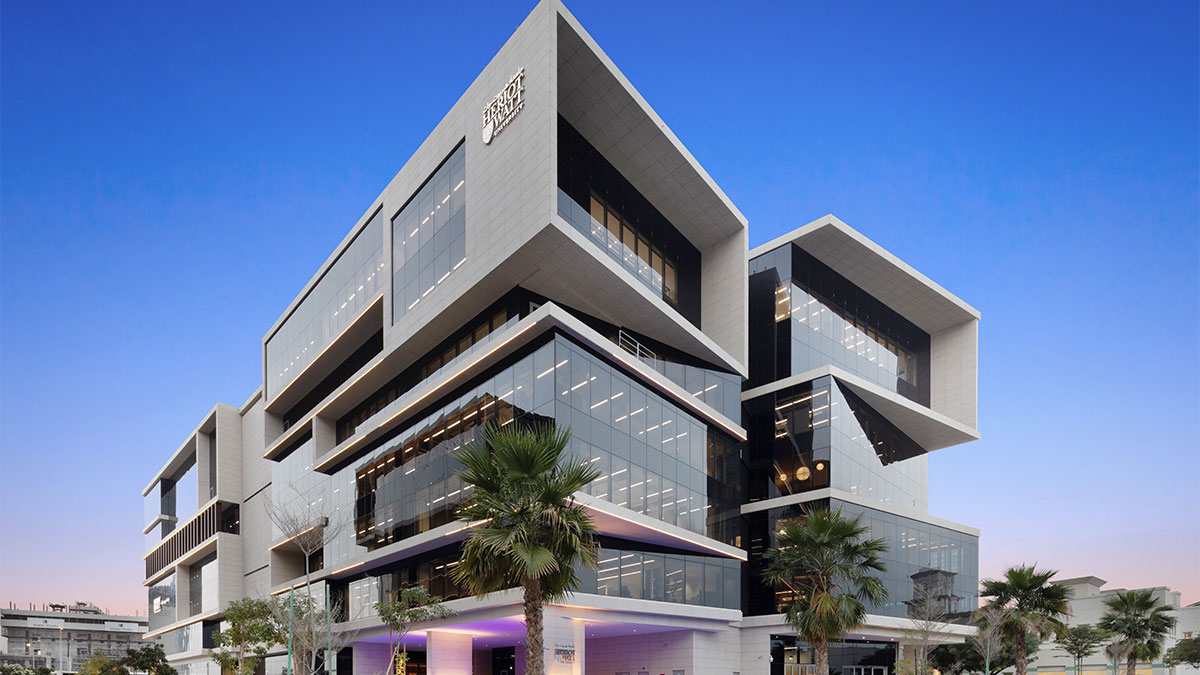Published:

The Centre of Excellence in Smart Construction (CESC), a global hub for innovation, industry-led research, and solutions development, held its second Board Member meeting at Heriot-Watt University Dubai's new campus in Dubai Knowledge Park.
The meeting was attended by His Excellency Dr. Abdullah Belhaif Al Nuaimi, who has also been the Board Chair of CESC for the past year and supports the Centre's mission of transforming the Built Environment. Other members of the board that attended the meeting were Professor Ammar Kaka, Provost and Vice Principal at Heriot-Watt University Dubai, Dr. Anas Bataw, Director at CESC, Dr. Olisanwendu Ogwuda, Centre Manager at CESC, Dr. Jumah Rashid Al-Mazrouie of Dubai Aviation Engineering, Maged El Hawary of ASGC Group, Richard Thompson of MEED, Tala Al Ansari of Expo 2020 and Iman Saab of Mott Macdonald.
Launched in September 2019, CESC partners with like-minded organisations and government entities to stimulate industry-led innovations and research-driven solutions to address challenges in the sector and lead economic growth in the region. CESC's model is built on the triple helix approach, bringing academia, industry, and governments together on one platform to achieve a positive impact. Academia develop the research needs, the industry contributes to innovation, and governments drive policy change.
Before the board meeting, H.E. Dr. Al Nuaimi also toured the CESC facilities at the University's campus.
Commenting on the board meeting and his visit, H.E. Dr. AlNuaimi said, “I was impressed with the state-of-the-art facilities of Heriot-Watt University's new Dubai campus, particularly the Robotics Lab and the Imagineering Cave. Being at a campus, surrounded by intelligent young minds, is always a source of pleasure to me because it is within the halls of academic institutions that future generations of leaders and innovators are forged. At the board member meeting, we discussed important topics, including the decarbonisation of the UAE's cement industry and the Blue/Green Roof joint initiative of CESC and Polypipe, the leading provider of sustainable water and climate management solutions for the built environment, as well as the Graduate Apprentice Schemes.”
Expressing the University's gratitude for the visit, Professor Ammar Kaka said, “We were delighted and grateful to have His Excellency Dr. Abdullah Belhaif Al Nuaimi amidst us at the second board member meeting of CESC. It was indeed a great moment for us to showcase the Enterprise Floors at the University where the CESC team works hard to address key challenges in the Built Environment. CESC is a unique initiative that brings together all three key components – academia, government, and industry that support and work towards environmental and other issues related to the industry. We are privileged to have His Excellency as the Chair of CESC as his unique position as the Minister of Climate Change and Environment provides the Centre with invaluable support and knowledge to create a better Built Environment in the UAE.”
At the board meeting, members discussed plans and announced a dedicated commitment to carbon neutrality of the cement industry in the UAE. The members pointed out that decarbonisation of the cement industry will help the reduction of CO2 emissions and support the industry's pathway towards the net-zero goal. CESC has committed itself to a holistic approach by integrating engineering, environmental and technical solutions with economic, behavioral, and policy aspects to enhance the entire Built Environment. As a research-driven entity, CESC is also working towards a coherent and cohesive approach to break silos and bring together top academia, industry, and government stakeholders that share a common vision.
As CESC grows and increases participation from the industry, the Built Environment landscape will benefit from this increased awareness and targeted approach. The Centre has laid out an ambitious visionary roadmap to achieve national low carbon emissions by 2035.